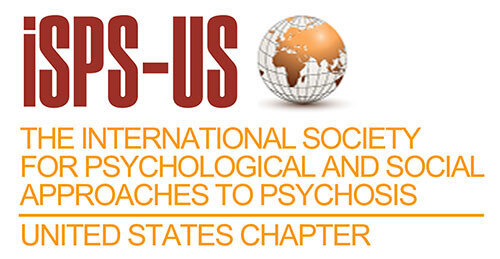
ISPS-US Board of Directors: Proposed Slate for 2025
From Marie Brown, PhD, ISPS-US Board President:
ISPS-US is at an exciting time in our organizational history: We are having our first ever Board of Directors vote! Previously, the Board of Directors was composed only of the Regional Branch Chairs. We found this approach too limiting because people were forced to be on the board that didn't ask to be, and it did not allow for people who are not Branch Chairs to join. With our recent bylaws amendment, we are now able to have anyone with an active ISPS-US membership run for a position on the board.
I am writing to announce the current slate of people running for Board of Directors beginning in January 2025:
Claire Bien, M.Ed. I am a mental health advocate and educator; author of a memoir, Hearing Voices, Living Fully: Living with the Voices in My Head; the immediate past president of ISPS-US; and a current member of the board of the Hearing Voices Network (HVN)-USA. My journey as a mental health advocate and educator began in 2009, when my employer sent me to the organizational meetings of the New Haven affiliate of NAMI. There I met so many people who believed that a diagnosis on the “schizophrenia” spectrum was sign and symptom of an intractable, incurable, disease of the brain, that I decided I needed to break my 26-year silence about my own voice-hearing experiences, diagnoses, and hospitalizations. In 2014, I became a trained HVN Support Group Facilitator, and in 2015 joined ISPS-US, after attending the ISPS International Congress in New York City. I have learned so much about the nature of my “luck,” and the reasons for my not needing ongoing medication management from both ISPS and the HVN. As a research associate at the Yale Program for Recovery and Community Health, I am deeply invested in bringing ISPS and HVN perspectives to collaborative work with cognitive neuroscientists at Yale who are similarly invested in exploring the intersections between psychological and social approaches to psychosis, neuroscience, and spirituality. I have also, thanks to the interest and kindness of ISPS friends, begun exploring more intentionally the impact of intergenerational and transgenerational/epigenetic trauma on the story of my own life.
Elan Cohen, PhD
Elan holds a PhD in Clinical Psychology from Adelphi University, where he researched the intersections of historical trauma and psychosis through the lenses of bioethics, biopolitics, and psychoanalysis. His clinical experience has included community mental health programs, state psychiatric centers, city hospitals, and outpatient clinics. Before graduate school, Elan worked at a crisis respite center and on an Open Dialogue mobile treatment team that was part of Parachute NYC. His writing has appeared in the Journal of Psychoanalysis, Culture & Society, Ethical Human Psychiatry and Psychology, and Psychosis. He is a member of the International Society for Psychological and Social Approaches to Psychosis (ISPS), where he was a recipient of the 2023 Bertram Karon Memorial Award. He is also a member of Division 39 of the APA, where he was awarded a scholarship from the Graduate Student and Early Career Committee Scholars Program. He is currently a postdoctoral fellow at Soho Psychoanalytic, where he works with adolescents and adults of all ages, identities, and socio-cultural backgrounds.
Sydney Harris
I became involved with ISPS-US as a mother of an adult son who began to suffer from extreme states as a college sophomore. ISPS-US has provided so many educational opportunities that have helped me to better understand this journey with my son. I am grateful to have found such a supportive community with like-minded people. Professionally, I am a founding co-director, Board and senior faculty member of the Alexander Training Institute of Los Angeles (ATI-LA), an approved school to train Alexander Technique teachers. I also practice privately in California, having been active since my certification in 1977. I am sad that my son has suffered so much. However, his suffering encouraged me to look at myself, not just try to fix him. I have done this through psychoanalysis, reading, and attending numerous webinars and courses. Combining this work with my professional experience, I hope that I have something unique to offer to other families in similar situations and perhaps even to those with lived experience.
Candice M. NunnTelfort (They/She)
Candice is a doctoral candidate at Garrett-Evangelical Theological Seminary in Pastoral Theology, Personality, and Culture - Clinical Track at the Center for Religion and Psychotherapy of Chicago. With a Bachelor of Science in Religious Studies and Political Science from Lincoln University, a Historically Black College and University (“HBCU”), and a Master of Theological Studies from Vanderbilt University Divinity School in Religion, Psychology, and Culture, Candice brings a rich interdisciplinary background to their research. Currently, they work at Openings, a clinic for Psychosis and Extreme States at Depth Counseling in Chicago, Illinois. Their dissertation lives at the confluence of anti-Blackness, psychosis and psychoanalysis. Candice presented twice at the 2023 ISPS-US annual conference and attended virtually this year. Candice comes to this work by partnering and walking beside their older brother who has navigated lifetimes of systemic failures by way of the western medical system.
Matt Perry
Matt is a Chicago-based author and disability advocate. He holds a Masters in Public Policy and Administration from Adler University and a JD from Case Western Reserve University. He currently works as the leader of a peer community support team at Thresholds, Chicago’s largest mental health services provider. From 2015-2018, he was the program director on a SAMHSA grant to organize mental health consumers in Illinois for advocacy. This entailed mobilizing people with lived experience of the mental health system to be engaged in policy tables where decisions about the mental health system were made. His debut novel, A Revolution of the Mind, is a work of literary fiction about how Chicago’s social structures create mental illness in its inhabitants. The Chicago Reader called it “a great Chicago novel.” He currently runs a Mad Pride Book Club out of the Center for Mad Culture in Chicago. He has additionally been in the mental health system in an inpatient and outpatient capacity. His work and writing is informed by his years of lived experience and study. In his free time, he enjoys piano, reading, cultural events around the city, and travel.
The last day to petition for additions to this slate is December 22nd 2024. Petitions to add new members are reviewed by the Nominating Committee. Please keep in mind the Nominating Committee is interested in staggering the people coming and going so everyone isn't leaving all at once. Due to this, you may be asked to hold your nomination until next year. Voting opens December 29th 2024: A further email will be sent on or before this date
